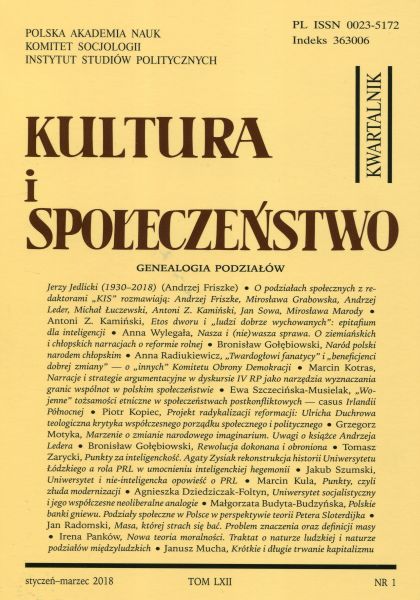Naród polski narodem chłopskim
The Polish Nation Is a Peasant Nation
Author(s): Bronisław GołębiowskiSubject(s): Politics, Sociology
Published by: Instytut Studiów Politycznych PAN
Keywords: history of Poland; historia Polski; nation; naród; Polish society; społeczeństwo polskie; peasants; chłopi; middle class; klasa średnia
Summary/Abstract: The author advances a thesis about the folk pedigree of the modern Polish nation. He sees the present shape of the nation in the history of Polish nationalism and proves that the long period after the nation’s loss of independence favored the nation’s image of itself as an nation “eternally faithful” to the Church, with a common religion, language, and customs. He emphasizes that the struggle for Polishness based on such a view of the nation was folk-oriented, egalitarian, and democratic, and that after the acquisition of statehood the country’s borders were decided by the Greater Poland and Silesian uprisings, which were popular in nature, and by the defeat of the Soviet offensive [sic] in 1920, thanks to the engagement of the common people. In restored Poland, peasant groupings undertook many political initiatives; a government was formed and announced a revolutionary program for a democratic state. The parliamentary act on agricultural reform, the Constitution of March 1921, and elections according to the new constitution showed that the people’s and workers’ parties had acquired significant power. Thanks to this activeness, the new Polish nation had a peasant face. The author connects his thesis about the folk pedigree of the Polish nation with the present as well.He gives examples of cultural continuity and of the contributions made by classes of the common people. He views the forming middle class as a post-peasant level, unequipped with mature cultural capital but balancing between folk—mainly peasant—culture and mass culture.
Journal: Kultura i Społeczeństwo
- Issue Year: 62/2018
- Issue No: 1
- Page Range: 101-121
- Page Count: 20
- Language: Polish

